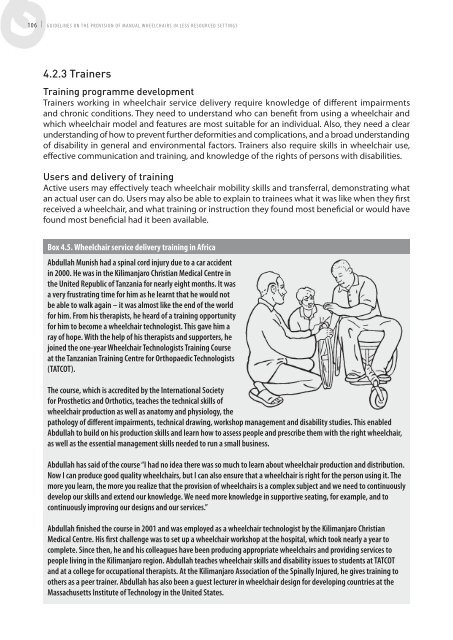Manual Wheelchairs - World Health Organization
Manual Wheelchairs - World Health Organization
Manual Wheelchairs - World Health Organization
Create successful ePaper yourself
Turn your PDF publications into a flip-book with our unique Google optimized e-Paper software.
106 I guIdelInes on the provIsIon of manual wheelchaIrs In less resourced settIngs<br />
4.2.3 Trainers<br />
Training programme development<br />
Trainers working in wheelchair service delivery require knowledge of different impairments<br />
and chronic conditions. They need to understand who can benefit from using a wheelchair and<br />
which wheelchair model and features are most suitable for an individual. Also, they need a clear<br />
understanding of how to prevent further deformities and complications, and a broad understanding<br />
of disability in general and environmental factors. Trainers also require skills in wheelchair use,<br />
effective communication and training, and knowledge of the rights of persons with disabilities.<br />
Users and delivery of training<br />
Active users may effectively teach wheelchair mobility skills and transferral, demonstrating what<br />
an actual user can do. Users may also be able to explain to trainees what it was like when they first<br />
received a wheelchair, and what training or instruction they found most beneficial or would have<br />
found most beneficial had it been available.<br />
Box 4.5. Wheelchair service delivery training in Africa<br />
Abdullah Munish had a spinal cord injury due to a car accident<br />
in 2000. He was in the Kilimanjaro Christian Medical Centre in<br />
the United republic of Tanzania for nearly eight months. It was<br />
a very frustrating time for him as he learnt that he would not<br />
be able to walk again – it was almost like the end of the world<br />
for him. From his therapists, he heard of a training opportunity<br />
for him to become a wheelchair technologist. This gave him a<br />
ray of hope. With the help of his therapists and supporters, he<br />
joined the one-year Wheelchair Technologists Training Course<br />
at the Tanzanian Training Centre for Orthopaedic Technologists<br />
(TATCOT).<br />
The course, which is accredited by the International Society<br />
for Prosthetics and Orthotics, teaches the technical skills of<br />
wheelchair production as well as anatomy and physiology, the<br />
pathology of different impairments, technical drawing, workshop management and disability studies. This enabled<br />
Abdullah to build on his production skills and learn how to assess people and prescribe them with the right wheelchair,<br />
as well as the essential management skills needed to run a small business.<br />
Abdullah has said of the course “I had no idea there was so much to learn about wheelchair production and distribution.<br />
now I can produce good quality wheelchairs, but I can also ensure that a wheelchair is right for the person using it. The<br />
more you learn, the more you realize that the provision of wheelchairs is a complex subject and we need to continuously<br />
develop our skills and extend our knowledge. We need more knowledge in supportive seating, for example, and to<br />
continuously improving our designs and our services.”<br />
Abdullah finished the course in 2001 and was employed as a wheelchair technologist by the Kilimanjaro Christian<br />
Medical Centre. His first challenge was to set up a wheelchair workshop at the hospital, which took nearly a year to<br />
complete. Since then, he and his colleagues have been producing appropriate wheelchairs and providing services to<br />
people living in the Kilimanjaro region. Abdullah teaches wheelchair skills and disability issues to students at TATCOT<br />
and at a college for occupational therapists. At the Kilimanjaro Association of the Spinally Injured, he gives training to<br />
others as a peer trainer. Abdullah has also been a guest lecturer in wheelchair design for developing countries at the<br />
Massachusetts Institute of Technology in the United States.

















